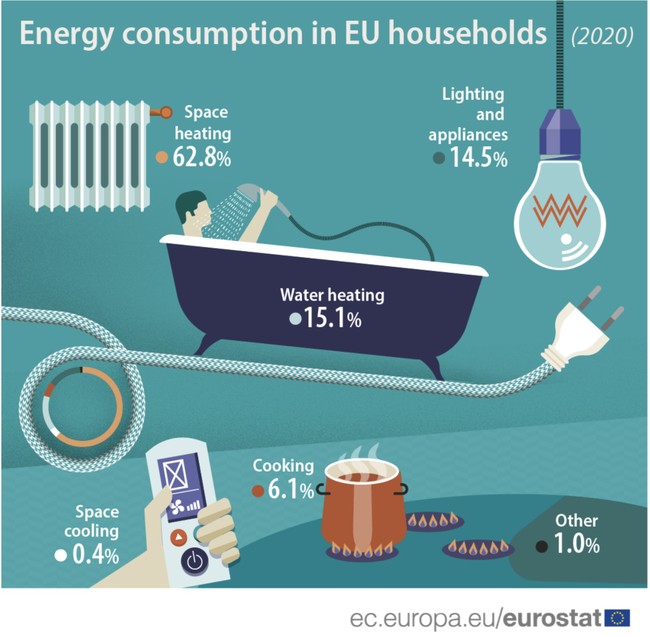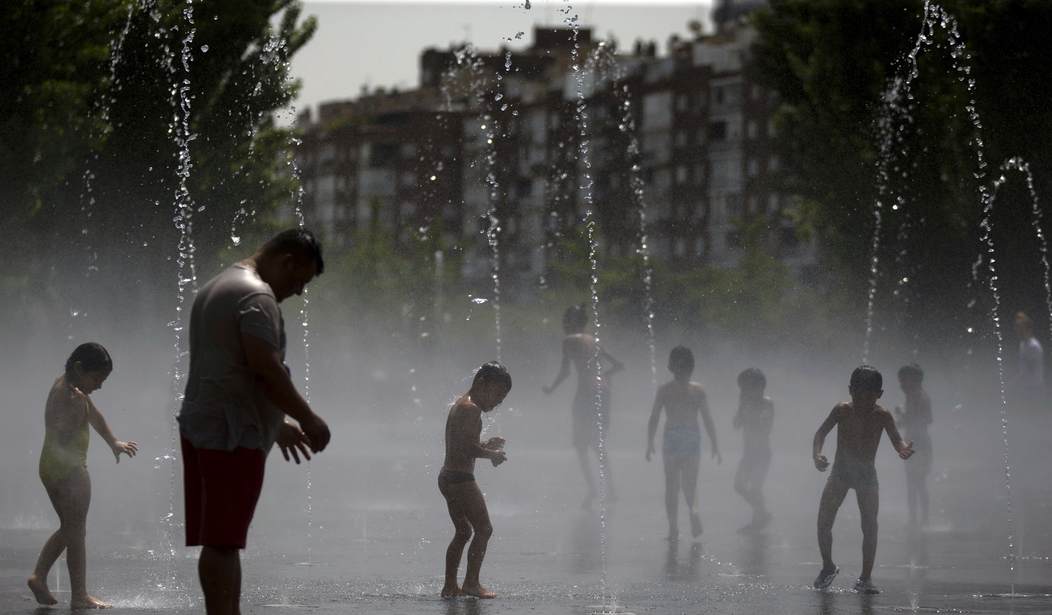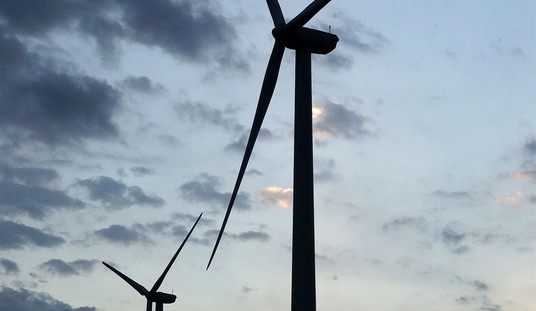If the power goes out during a heat wave, it could become a catastrophe for vulnerable people.
That's why we have to move as quickly as possible to decrease energy availability and grid reliability and reduce the use of energy-consuming appliances like air conditioning.
As heat waves intensify across the world due to the climate crisis, author @jeffgoodell says scientists increasingly worry about how vulnerable many populations are to power failures that take out air conditioning amid life-threatening temperatures. pic.twitter.com/GGu1MaZEf9
— Democracy Now! (@democracynow) June 7, 2024
That, my friend, is how climate change alarmist fanatics think if you are willing to use that verb to describe the meanderings of their fevered imaginations.
There is something about the liberal mindset that leads people to devise the most convoluted theories about how and why disaster will strike, propose wildly expensive and destructive solutions, and then sell their theoretical dystopian scenarios to the public to get paid astronomical sums to solve non-existent problems.
Frankly, I think we should just give them all a stipend to go away and leave the rest of us alone. Give them an island or something where they get to experiment on each other, lecture each other, and leave the rest of us the hell alone.
Jeff Goodell is an author making the rounds selling an interesting climate apocalypse scenario: there is a grid collapse of some kind that happens during a heat wave (caused, of course, by climate change) that kills people who otherwise may have lived without climate change.
The loss of power kills air conditioning, you see, making us vulnerable to all that heat. Imagine Houston without A/C (I will have to talk to Karen about that!). People could die!
Read @JeffGoodell on the "heat wave scenario that keeps climate scientists up at night." It will keep you up, too: https://t.co/eGrzQUjjiR
— Elizabeth Kolbert (@ElizKolbert) June 3, 2024
Well, yes, although heat and Houston go together like peas and carrots, and did so well before A/C was common. A bad summer day in New York City is miserable as well, and it occasionally gets above 100 degrees even in Minneapolis, my home.
Jeff wants to prevent this dread scenario by addressing climate change. To avoid Houston facing temperature increases of 2 degrees, let's switch to less reliable forms of energy, a less stable grid, and less mobility for people. That will fix things.
WTF?
On a recent Thursday evening, a freakish windstorm called a derecho (Spanish for “straight ahead”) hit Houston, a city of more than two million people that also happens to be the epicenter of the fossil fuel industry in America.
In a matter of minutes, winds of up to 100 miles per hour blew out windows on office buildings, uprooted trees and toppled electric poles and transmission towers. Nearly a million households lost power. Which meant that not only was there no light, but there was no air-conditioning. The damage from the storm was so extensive that, five days later, more than 100,000 homes and businesses were still marooned in the heat and darkness.
Luckily, the day the derecho blew in, the temperature in Houston, a city infamous for its swampy summers, was in the low to mid-80s. Hot, to be sure, but for most healthy people, not life-threatening. Of the at least eight deaths reported as a result of the storm, none were from heat exposure.
But if this storm had arrived several days later, perhaps over the Memorial Day weekend, when the temperature in Houston hit 96 degrees, with a heat index as high as 115, it might have been a very different story. “The Hurricane Katrina of extreme heat” is how Mikhail Chester, director of the Metis Center for Infrastructure and Sustainable Engineering at Arizona State University, once put it to me, echoing the memory of the catastrophic 2005 hurricane that struck Louisiana, devastated New Orleans and killed more than 1,300 people.
I grew up in Tucson, AZ, and I know a thing or two about heat, and even heat without air conditioning. I remember my sister getting heat stroke when we were playing mini-golf one day--yes, we were outside on a particularly hot day and she didn't drink enough.
No A/C, I am afraid. It sucked, but at least it was a dry heat.
Climate activists are obsessed with scaring us about deaths from increased heat, despite the fact that heat causes far fewer deaths than cold, and always has. Human beings evolved in tropical climates, after all.
Cold weather causes or contributes to 8.5 times as many deaths as hot weather. Their sample size wasn't exactly small: they examined almost 75 million cases.
We analysed 74 225 200 deaths in various periods between 1985 and 2012. In total, 7·71% (95% empirical CI 7·43–7·91) of mortality was attributable to non-optimum temperature in the selected countries within the study period, with substantial differences between countries, ranging from 3·37% (3·06 to 3·63) in Thailand to 11·00% (9·29 to 12·47) in China. The temperature percentile of minimum mortality varied from roughly the 60th percentile in tropical areas to about the 80–90th percentile in temperate regions. More temperature-attributable deaths were caused by cold (7·29%, 7·02–7·49) than by heat (0·42%, 0·39–0·44). Extreme cold and hot temperatures were responsible for 0·86% (0·84–0·87) of total mortality.
Another study on seasonal mortality showed the lowest mortality from late summer to early fall. The highest rates of deaths in the Northern Hemisphere were in December, January, and February.
For each of the 5 European Mediterranean countries included, the lowest average daily mortality occurred in September over the period for which relevant data could be retrieved. Specifically, the lowest observed average daily mortality occurred in September for 4 of the 9 (44%) years evaluated for Cyprus, 3 of the 11 (27%) years for France, 42 of the 47 (89%) years for Greece, 41 of the 57 (72%) years for Italy, and 34 of the 44 (80%) years for Spain. In Sweden, a northern European country, the lowest observed average daily mortality was in August for 14 of the 20 (70%) years evaluated.
For both Canada and the US, the lowest observed average daily mortality occurred in August over the period for which data could be retrieved. Specifically, August had the lowest daily mortality for 10 of the 16 (63%) years evaluated for Canada and 22 of the 34 (65%) years evaluated for the US.
In Australia, the lowest observed average daily mortality occurred in March for 70% of the years evaluated (7 of 10 years). In New Zealand, the lowest observed average daily mortality occurred in February for the entire 24-year period for which data could be retrieved. Monthly mortality data for each specific year were not publicly available.
In Japan, the lowest observed average daily mortality was in July for the 2-year period for which data could be retrieved (2 of 2 years [100%]).
From this data, we are to conclude that global warming is going to kill people in massive numbers, right? And the solution to increased heat is to make our energy consumption plummet.
Heating, by the way, uses far more energy than cooling. In the United States, 60% of all home energy use is used to heat homes, while 6% is used for cooling. In Europe, where A/C use is far lower, 0.6% of energy used in homes is used for cooling, while 62% is used for heating.

Can you see the bulls**t in Goodell's argument, if you could call it that?
"Argument" is the wrong word. Rather, it's a fairy tale sexed up to scare people, and from that fairy tale we are to conclude that Westerners should rework our energy system to be less reliable, even though a more reliable energy sector would solve the (almost non-) problem he wants us to be scared of.
If liberals were rational people they would laugh along with the rest of us at how wrong, illogical, and ridiculous this "Scenario that Keeps Climate Scientists Up at Night" really is, but this propaganda actually works. Being right, logical, and pragmatic are the enemy of Leftists.
No doubt Goodell has an explanation for why all the facts I laid out are irrelevant, just at the pandemic fanatics still argue that pursuing policies that killed far more people than the virus did was the right thing to do.
It's impossible to argue with these people because reality doesn't exist in their world. They start with a conclusion and work their way backward.
The best we can do is get them away from power whenever possible.








Join the conversation as a VIP Member